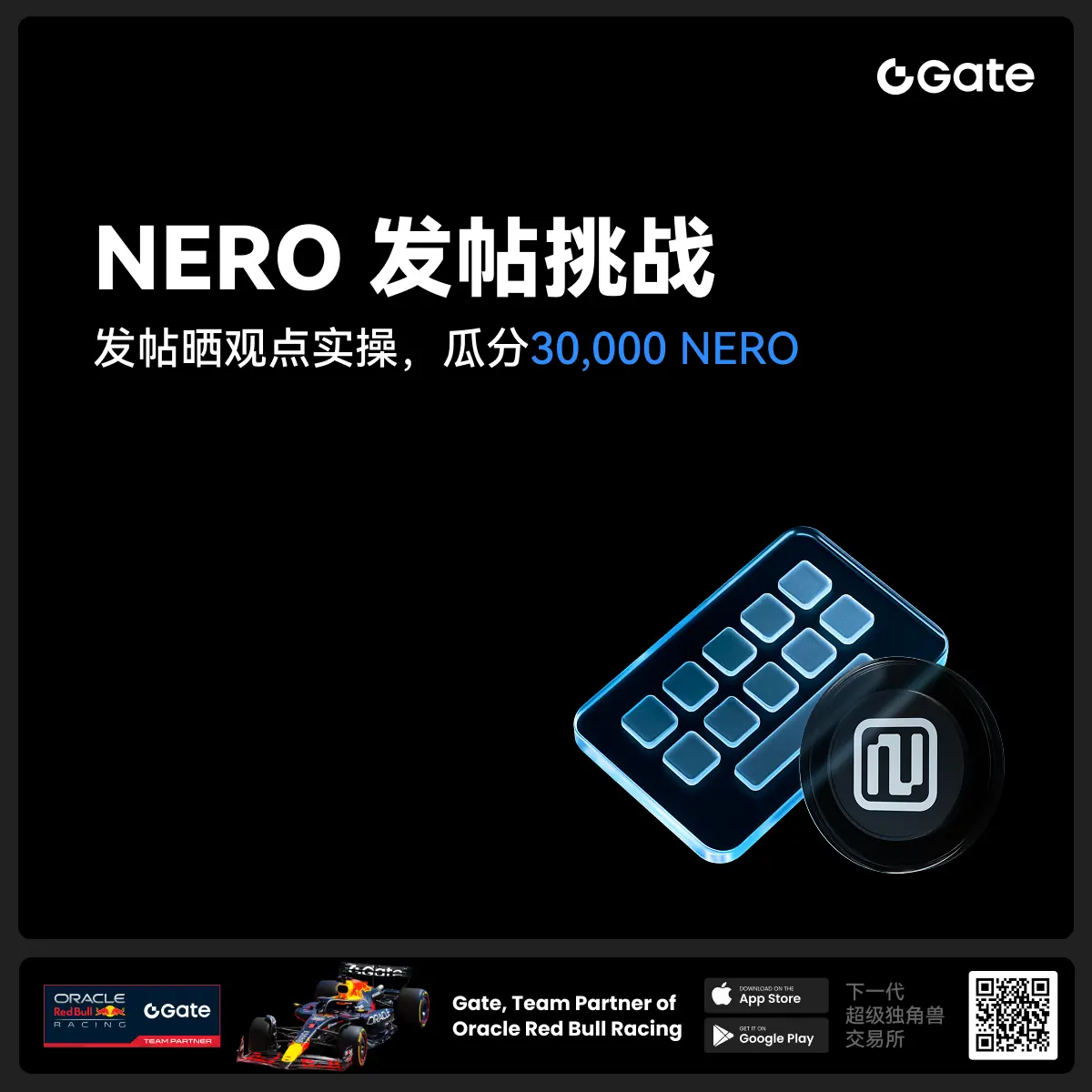- 话题1/3
89k 热度
62k 热度
77k 热度
11k 热度
24k 热度
- 置顶
- 🎉 #CandyDrop合约挑战# 正式开启!参与即可瓜分 6 BTC 豪华奖池!
📢 在 Gate 广场带话题发布你的合约体验
🎁 优质贴文用户瓜分$500 合约体验金券,20位名额等你上榜!
📅 活动时间:2025 年 8 月 1 日 15:00 - 8 月 15 日 19:00 (UTC+8)
👉 活动链接:https://www.gate.com/candy-drop/detail/BTC-98
敢合约,敢盈利
- 🎉 攒成长值,抽华为Mate三折叠!广场第 1️⃣ 2️⃣ 期夏季成长值抽奖大狂欢开启!
总奖池超 $10,000+,华为Mate三折叠手机、F1红牛赛车模型、Gate限量周边、热门代币等你来抽!
立即抽奖 👉 https://www.gate.com/activities/pointprize?now_period=12
如何快速赚成长值?
1️⃣ 进入【广场】,点击头像旁标识进入【社区中心】
2️⃣ 完成发帖、评论、点赞、发言等日常任务,成长值拿不停
100%有奖,抽到赚到,大奖等你抱走,赶紧试试手气!
截止于 8月9日 24:00 (UTC+8)
详情: https://www.gate.com/announcements/article/46384
#成长值抽奖12期开启#
- 📢 Gate广场 #NERO发帖挑战# 秀观点赢大奖活动火热开启!
Gate NERO生态周来袭!发帖秀出NERO项目洞察和活动实用攻略,瓜分30,000NERO!
💰️ 15位优质发帖用户 * 2,000枚NERO每人
如何参与:
1️⃣ 调研NERO项目
对NERO的基本面、社区治理、发展目标、代币经济模型等方面进行研究,分享你对项目的深度研究。
2️⃣ 参与并分享真实体验
参与NERO生态周相关活动,并晒出你的参与截图、收益图或实用教程。可以是收益展示、简明易懂的新手攻略、小窍门,也可以是行情点位分析,内容详实优先。
3️⃣ 鼓励带新互动
如果你的帖子吸引到他人参与活动,或者有好友评论“已参与/已交易”,将大幅提升你的获奖概率!
NERO热门活动(帖文需附以下活动链接):
NERO Chain (NERO) 生态周:Gate 已上线 NERO 现货交易,为回馈平台用户,HODLer Airdrop、Launchpool、CandyDrop、余币宝已上线 NERO,邀您体验。参与攻略见公告:https://www.gate.com/announcements/article/46284
高质量帖子Tips:
教程越详细、图片越直观、互动量越高,获奖几率越大!
市场见解独到、真实参与经历、有带新互动者,评选将优先考虑。
帖子需原创,字数不少于250字,且需获得至少3条有效互动
- 🎉 亲爱的广场小伙伴们,福利不停,精彩不断!目前广场上这些热门发帖赢奖活动火热进行中,发帖越多,奖励越多,快来GET你的专属好礼吧!🚀
1️⃣ #GateLaunchpad上线IKA# |IKA认购体验
在Gate广场带话题晒出你的IKA Launchpad认购体验,4位幸运分享者讲瓜分$200分享奖池!
详情 👉️ https://www.gate.com/post/status/12566958
2️⃣ #ETH冲击4800# |行情分析预测
大胆发帖预测ETH走势,展示你的市场洞察力!10位幸运用户将平分0.1 ETH 奖励!
详情 👉️ https://www.gate.com/post/status/12322403
3️⃣ #创作者活动第二期# |ZKWASM话题
在广场或推特发布与 ZKWASM 或其交易活动相关的原创内容,瓜分4,000枚ZKWASM!
详情 👉️ https://www.gate.com/post/status/12525794
4️⃣ #Gate广场征文活动第二期# |ERA话题
谈谈你对ERA的观点/体验,参与并推广活动,700 ERA大奖等你赢!
详情 👉️ https://www.gate.com/post/status/12361653
5️⃣ #MBG任务挑战# |MBG话题
分享你对MBG的洞察,积极参与和推广MBG活动,20位小
eCash(XEC)是什么?比特币和比特币现金的分叉
比特币被誉为加密货币之王。然而,其扩展性常被视为该币的一个限制。为解决这个问题,许多加密货币项目从比特币中分叉,其中典型的是比特币现金ABC(BCHA)。随后,比特币现金ABC(BCHA)更名为eCash。那么eCash(XEC)是什么呢?
什么是eCash (XEC)?
eCash项目曾被称为Bitcoin Cash ABC。这是比特币(BTC)协议的一个分叉,并具有更积极的技术路线。eCash已正式宣布与比特币(BTC)和比特币现金(BCH)分道扬镳,同时代币也已从BCHA更名为XEC。
除了更名之外,eCash 还实施了权益证明(PoS)共识算法,引入了抵押机制,提升了交易速度并将小数位数从八位减少到两位。
eCash的目标是为主要的区块链提供可扩展的规模。此外,创新独特的Avalanche共识层是eCash技术的一个亮点。该项目还旨在引入比特币中从未有过的功能,如投注机制、网络升级而无需进行分叉,以及子链。
eCash是如何工作的?
在eCash模型中,用户可以在加密货币交易所购买XEC币,或者进行挖矿以拥有它们。然后,这些币将存储在您的硬盘上,直到您准备使用它们。例如,当您准备在线购物时,您将使用您的“数字钱包”向卖家转账。然而,请注意卖家也需要类似的“数字钱包”软件才能接收您的款项。
钱包管理软件将由eCash银行进行管理,并且通过该软件进行的转账将得到验证。这类似于借记卡和信用卡交易背后的支付方式。
经过资金验证后,卖方可以支付交易费用将资金转入传统银行。
eCash的一些突出特点
隐私权是货币的核心要素,eCash的CashFusion协议因此至关重要。CashFusion在保持可验证的货币供应的同时提供了匿名性能力。该协议还可以随时在Electrum ABC中启用或禁用。
XEC是什么?
2021年7月1日,Bitcoin Cash ABC(BCHA)更名为eCash(XEC)。随着升级,所有用户的BCHA代币将按照1:1,000,000的比例转换为XEC。
XEC的前身是BCHA,这是一种从比特币现金分叉出来的加密货币,因此XEC的流通量将与市场上的比特币现金数量相对应。然而,由于转变为PoS共识机制,新的XEC将通过用户在系统中进行质押来创建和分发。eCash也遵循类似比特币的减半时间表,每210,000个区块后减半奖励。
eCash 项目开发团队
eCash是由一组经验丰富的比特币开发人员创建的,他们曾创立比特币现金,其中最著名的是Amaury Sechet。
Amaury Sechet曾在Facebook担任软件工程师,并是Stupid D Compiler的主要开发人员。他也在以前的Bitcoin Cash开发中发挥了非常积极的作用。
比特币现金(Bitcoin Cash)运行一段时间后,Amaury Sechet提议将挖矿所得的8%资金投入由他管理的项目发展基金中。
这个提案在比特币现金社区引发了争议。为了解决这个问题,他们决定进行硬分叉,最终的结果是eCash的诞生。